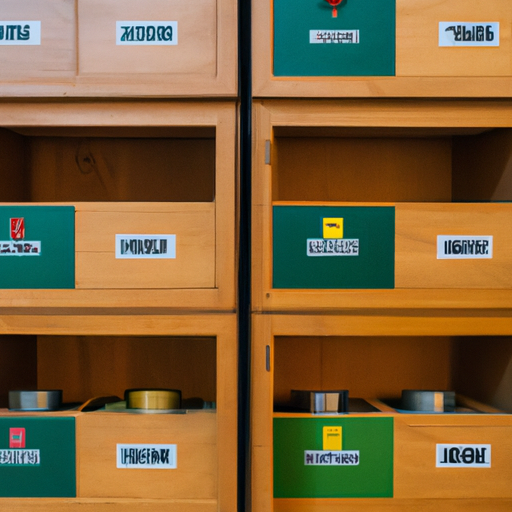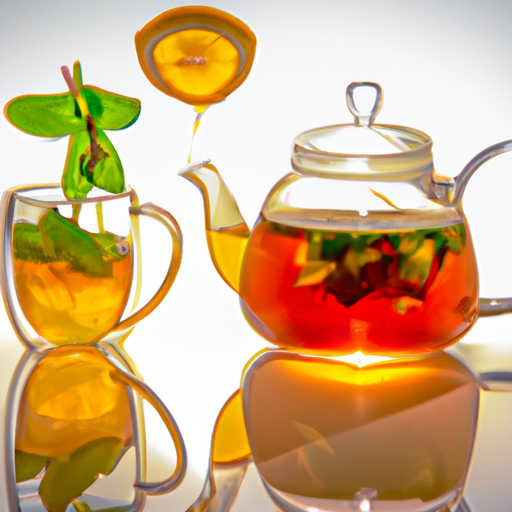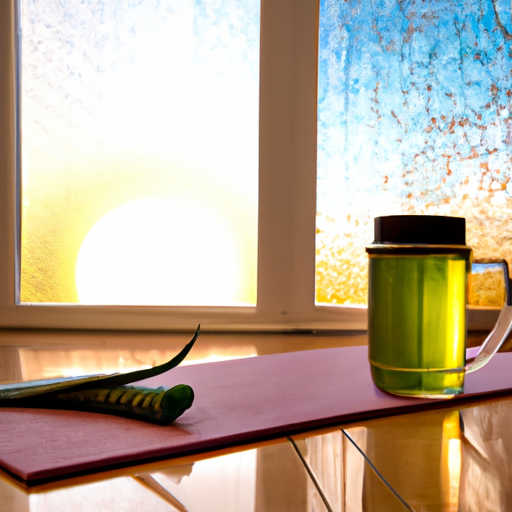While enjoying a hot cup of herbal tea, I find myself pondering the shelf life of the tea bags stored in my pantry. How long will they maintain their flavor and effectiveness before deteriorating?
It’s a question that many tea enthusiasts ponder, and one that deserves a definitive answer. In this article, I will delve into the world of herbal tea bags, exploring the factors that affect their shelf life and the proper storage techniques to extend their freshness. I will also discuss the telltale signs of spoiled tea bags and share tips on making the most of expired ones.
Additionally, I will provide valuable insights on buying and using fresh herbal tea bags. So, if you’re curious about the longevity of your beloved tea bags, join me on this journey to discover the secrets of enjoying fresh and flavorful herbal tea.
Key Takeaways
- Herbal tea bags typically have a shelf life of 1-2 years when stored properly.
- Factors affecting the lifespan of herbal tea bags include oxygen exposure, moisture control, and light protection.
- Proper storage techniques include storing tea bags in an airtight container, away from light, heat, and moisture.
- Signs of spoiled tea bags include the presence of mold and a musty or unpleasant odor.
Understanding Shelf Life of Herbal Tea Bags
Discover the secret to enjoying your herbal tea for longer by understanding the shelf life of those delightful tea bags!
Extending the shelf life of herbal tea and preserving its freshness is crucial for tea enthusiasts.
Herbal tea bags typically have a shelf life of 1-2 years when stored properly. To extend the shelf life, store the tea bags in an airtight container away from light, heat, and moisture. This will prevent oxidation and maintain the tea’s flavor and aroma.
Additionally, avoid storing herbal tea bags near strong-smelling substances as they can absorb odors easily.
Factors such as the quality of the tea leaves, packaging, and storage conditions can affect the lifespan of herbal tea bags. Understanding these factors will help you enjoy your herbal tea bags for longer and savor their delightful flavors.
Factors Affecting the Lifespan of Herbal Tea Bags
While considering various factors, it’s important to explore what influences the lifespan of herbal tea bags. Shelf stability plays a crucial role in determining how long these tea bags will last. The quality and durability of the packaging materials used also impact their longevity.
Here are three key factors to consider:
-
Oxygen exposure: Exposure to oxygen can degrade the quality of herbal tea bags over time. Proper packaging, such as airtight containers or individually sealed bags, can help minimize oxygen exposure and extend shelf life.
-
Moisture control: Moisture can lead to mold or spoilage of herbal tea bags. Packaging that provides moisture barrier properties, like foil-lined bags, can help protect the tea bags from moisture and maintain their freshness.
-
Light protection: Exposure to light, especially sunlight, can degrade the quality and flavor of herbal tea bags. Packaging that offers light protection, such as opaque bags or dark-colored containers, can help preserve the tea bags for longer periods.
Understanding these factors can help in selecting the right packaging and proper storage techniques to extend the shelf life of herbal tea bags.
Proper Storage Techniques to Extend Shelf Life
To make your herbal tea bags stand the test of time, store them in a cool, dark place, like a hidden treasure in a secret chest. This will help prolong their freshness and preserve their flavor. Exposure to heat, light, and moisture can accelerate the deterioration process, causing the tea bags to lose their potency and taste.
By keeping them in a cool and dark environment, you’re preventing these factors from affecting the tea bags. Additionally, make sure to seal the bags properly after each use to prevent any air or moisture from entering. Proper storage techniques are essential in maintaining the quality of your herbal tea bags for a longer period.
Now that we know how to preserve their freshness, let’s move on to the next section about signs of spoiled tea bags.
Signs of Spoiled Tea Bags
Ensure you’re not left with a bitter surprise by keeping an eye out for these telltale signs that your tea bags’ve gone bad. One of the most obvious signs’s the presence of mold. If you notice any fuzzy or discolored patches on your tea bags, it’s a clear indication that they’ve spoiled and should be discarded immediately.
Mold can pose health risks, especially for individuals with compromised immune systems. Additionally, if your tea bags’ve been stored improperly and’ve absorbed excess moisture, they may develop a musty or unpleasant odor. This can also be a sign that the tea bags’re no longer good to use.
By being vigilant and recognizing these signs, you can ensure that you’re always enjoying fresh and safe herbal tea.
Now, let’s explore how to make the most of expired tea bags.
Making the Most of Expired Tea Bags
If you’re feeling adventurous and want to infuse some unexpected flavors into your culinary creations, don’t throw away those expired tea bags just yet! Utilizing expired tea bags can open up a world of creative uses for old tea bags. Here are three ways to make the most of them:
-
Potpourri: Open up the expired tea bags and mix the dried herbs with other aromatic ingredients like dried flowers or citrus peels. Place the mixture in small sachets and scatter them around your home for a natural, refreshing scent.
-
Bath Soak: Steep the expired tea bags in hot water and add the infused water to your bath for a soothing and aromatic experience. The herbs from the tea bags can help relax your muscles and rejuvenate your senses.
-
Compost: If all else fails, don’t let those expired tea bags go to waste. Tear open the bags and add the dried herbs to your compost pile. They’ll decompose and enrich the soil, providing nutrients for your plants.
Now that you know how to make the most of expired tea bags, let’s move on to some tips for buying and using fresh herbal tea bags.
Tips for Buying and Using Fresh Herbal Tea Bags
When purchasing and using fresh herbal tea bags, you’ll discover a world of aromatic flavors and soothing benefits to enhance your daily routine. Buying organic herbal tea bags ensures that you’re getting the highest quality ingredients without any harmful pesticides or chemicals.
Look for reputable brands that prioritize sustainability and ethical sourcing practices. Experiment with different brewing techniques to find your perfect cup of herbal tea. Steeping times and water temperatures can vary depending on the type of herbal tea you’re brewing, so be sure to follow the instructions on the packaging for optimal flavor.
With a wide variety of herbal tea options available, from calming chamomile to energizing peppermint, there’s something for everyone.
Transitioning into the subsequent section, we’ll explore the conclusion: enjoying fresh and flavorful herbal tea.
Conclusion: Enjoying Fresh and Flavorful Herbal Tea
Savor the delightful bouquet of flavors and let your taste buds embark on a blissful journey with every sip of fresh herbal tea. To ensure that you continue to enjoy the full spectrum of flavors, it’s important to extend the shelf life of your herbal tea bags and preserve their flavors. Here are some tips to help you do just that:
- Store your herbal tea bags in an airtight container to prevent exposure to air and moisture.
- Keep your tea bags away from heat and sunlight, as they can degrade the flavors.
- Avoid storing your herbal tea bags near strong-smelling ingredients, as they can absorb unwanted odors.
- Consider freezing your herbal tea bags if you want to prolong their shelf life.
By following these simple guidelines, you can keep your herbal tea bags fresh and flavorful for longer, allowing you to fully enjoy every sip of your favorite brew.
So go ahead, indulge in the calming and refreshing experience that fresh herbal tea brings.
Frequently Asked Questions
Can herbal tea bags be used after their expiration date?
Herbal tea bags can be stored in the refrigerator to extend their shelf life. However, even if they are past their expiration date, they can still be used, although their flavor may diminish over time.
How long do herbal tea bags typically stay fresh?
Herbal tea bags typically stay fresh for up to a year when stored properly. To keep them at their best, store in an airtight container away from light and moisture. Different types of herbal teas have varying recommended steeping times.
Can I reuse herbal tea bags?
Yes, herbal tea bags can be reused, but it’s best to use them fresh for maximum flavor and benefits. To store them properly, keep them in an airtight container away from moisture and sunlight.
What are the signs that herbal tea bags have gone bad?
Signs of spoilage in herbal tea bags include a musty or off smell, visible mold, or a change in color or texture. To properly store them, keep them in an airtight container away from heat and moisture.
Are there any health risks associated with using expired herbal tea bags?
Expired herbal tea bags may pose health risks due to the potential growth of harmful bacteria. Proper storage, such as keeping them in a cool, dry place, can help maintain their health benefits and reduce the risk of contamination.
Conclusion
In conclusion, it’s essential to store herbal tea bags properly to maintain their freshness and flavor for an extended period. By following the recommended storage techniques, such as keeping them in a cool, dry place away from sunlight and moisture, you can maximize the shelf life of your tea bags.
Interestingly, did you know that the average lifespan of herbal tea bags is about 2 years? So, make sure to check the expiration date and enjoy your fresh and flavorful herbal tea while it lasts!










